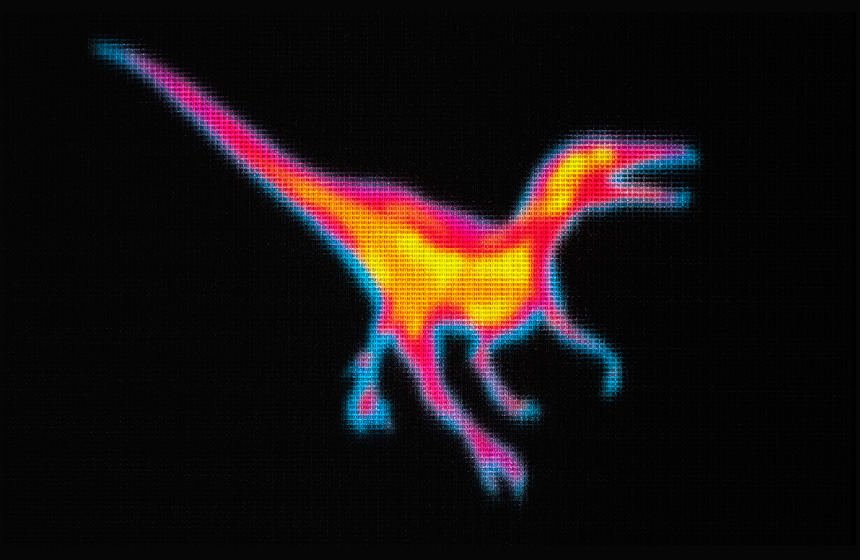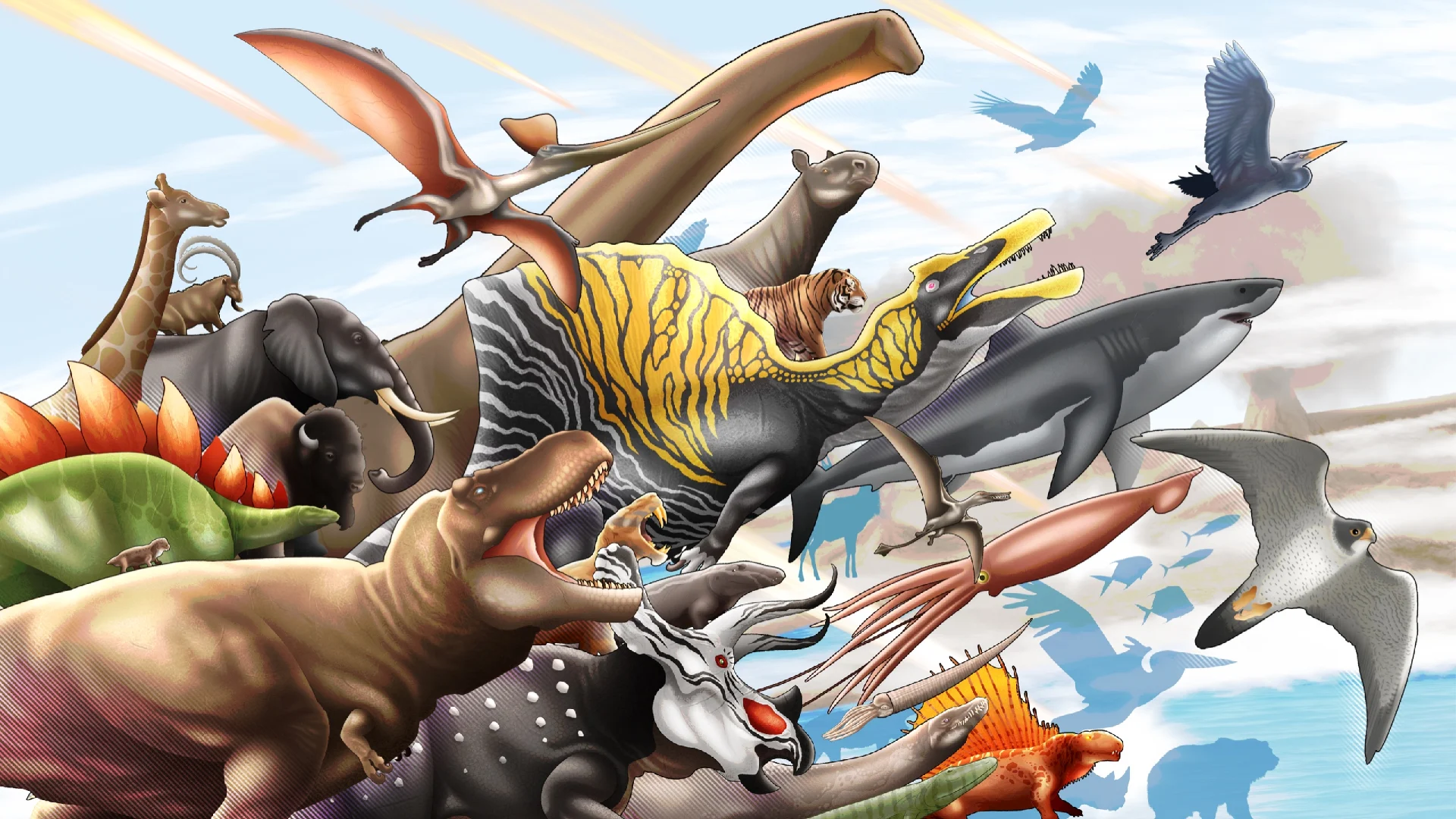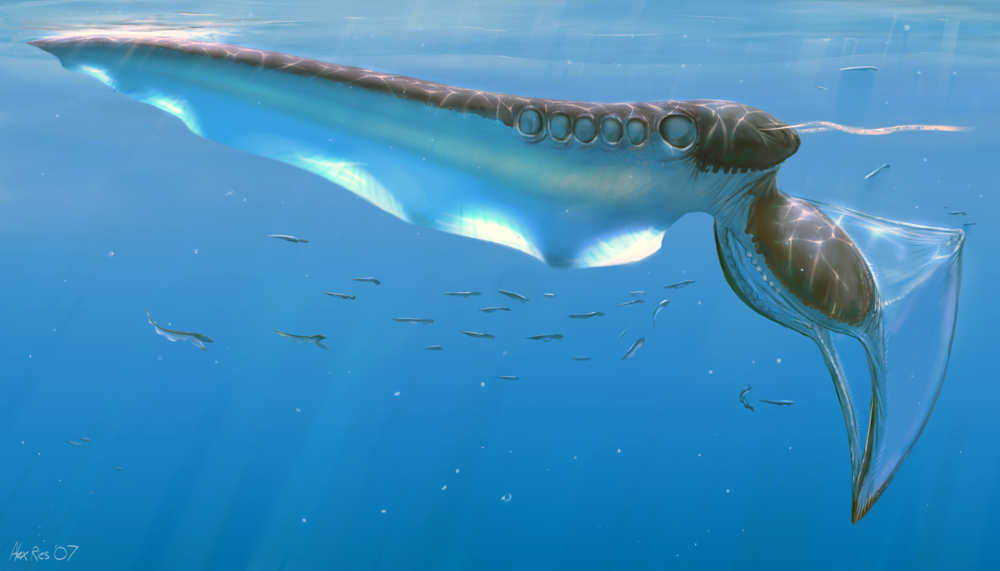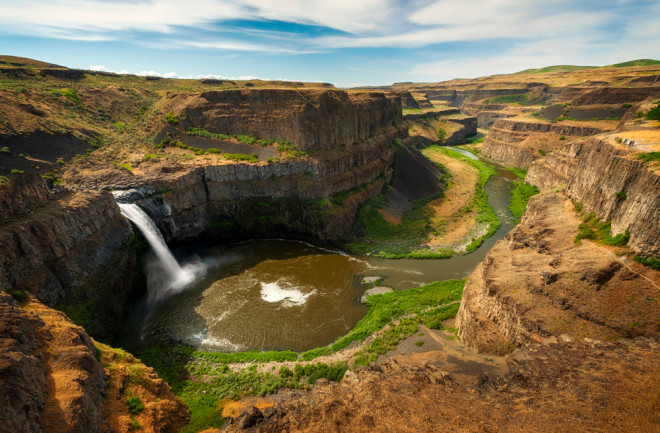|
|
Post by Infinity Blade on Jun 9, 2017 21:35:08 GMT 5
I've decided to create a thread dedicated to discussion regarding the story of Noah's Ark. I'm going to guess at least most of us here believe it is a flat out impossible myth, so those who believe so can give explanations here. Or for those who actually do believe the story of the Biblical flood, they can try and defend it here.
I shall make the first contribution with two videos that sum up the animal problem.
|
|
|
|
Post by creature386 on Jun 10, 2017 0:55:17 GMT 5
|
|
|
|
Post by Life on Jun 10, 2017 15:30:47 GMT 5
We cannot (and should not) rule out the possibility of occurrence of a Great Flood in the past due to inaccuracies of ancient Biblical accounts. Please keep in mind that ancient biblical accounts are not scientific and/or archaeological research works but a collection of traditions passed down from generation to generation. However, they must be inspired by 'certain events in the past' because they are (not) alone in describing them. The legend of a great flood is not restricted to Middle Eastern landscapes (and biblical accounts) only; similar legends were prevalent in other parts of the world as well but they did not get much publicity? For example: news.nationalgeographic.com/2016/08/china-yellow-river-great-flood-xia-dynasty-yu/--- Below is a fascinating read: Source: discovermagazine.com/2012/jul-aug/06-biblical-type-floods-real-absolutely-enormousThe aforementioned article brings another fact to our attention: scientific communities are susceptible to biases and narrative-building much like less-informed people: Isn't it sad? If scientific community is prone to such behaviors, imagine the amount of disinformation they have been feeding us all these years with their biased narrative-building. --- The legend of Noah's Ark might be grounded in true events. Noah might be a real person who was probably good at exploring landscapes and probably noticed the signs (build-up of conditions that may lead to flooding of his settlement) and warned his community about it, only to face rejection. However, he might have build a large boat and stockpiled it with a large amount of resources [including animals] with support of his friends and family members. Think about it. Scientific communities are susceptible to biases and narrative-building much like less-informed people. A bold few who challenge the status-quo with out-of-the-box ideas, risk the prospects of alienation and rejection much like Harlen Bretz. Nobody can take a look at modern composition of landscapes and tell everything about them and what happened there throughout the ages. Criticism should be constructive, not biased. |
|
|
|
Post by creature386 on Jun 11, 2017 15:50:27 GMT 5
To be fair, there have been many claims of localized floods in the Near East to account for the Noachian and Sumerian flood myths, so I won't call the scientific community close-minded to huge floods: en.wikipedia.org/wiki/Flood_myth#Claims_of_historicityAnd similar floods have been proposed as a result of deglaciations to explain flood myths of other cultures. The only thing where you could call the scientific community dismissive towards is the idea of a global flood. |
|
|
|
Post by Life on Jun 12, 2017 1:53:24 GMT 5
To be fair, there have been many claims of localized floods in the Near East to account for the Noachian and Sumerian flood myths, so I won't call the scientific community close-minded to huge floods: en.wikipedia.org/wiki/Flood_myth#Claims_of_historicityAnd similar floods have been proposed as a result of deglaciations to explain flood myths of other cultures. The only thing where you could call the scientific community dismissive towards is the idea of a global flood. Really, my friend? Story of Harlen Bretz suggests otherwise: Source: news.nationalgeographic.com/2017/03/channeled-scablands/--- Here is another confession: nautil.us/issue/25/Water/the-real-landscapes-of-the-great-flood-mythsI find the conclusion interesting: --- Experts/Scientists are prone to dogmas and biases much like normal people; some are hellbent on discrediting ancient sources of knowledge that shaped civilizations in earlier times and advancing theories that give the impression that creation does not happens, intelligent design is improbable and all developments are random. This dogma continues to hamper efforts to achieve a more balanced understanding of developments/events and resultant narrative-building contributes to confusion of less-informed people. Some people mistakenly assume that scientific studies can capture all realities; they cannot. Even scientific theories cannot. Even with science in the picture, it is all the same. --- Now that skepticism begrudgingly gave ground to assessments of massive flooding events in regional context, global flood hypothesis should remain an impossibility nonetheless. Again, global-flooding might seem improbable in the light of shortcomings in evidence at hand but are we considering all possibilities and clues for it? I don't think so. Global-flooding might also be a possibility under the right set of circumstances; appropriate conditions with some sort of extraterrestrial intervention added into the mix. Chances of this happening might be slim but should we rule out the possibility altogether? Here is an interesting read: news.nationalgeographic.com/2017/01/comet-new-years-eve-newton-flood-bible-gravity-science/ |
|
|
|
Post by creature386 on Jun 12, 2017 23:05:04 GMT 5
Hm, this story sounds like a perfectly normal paradigm shift. If you looked at the history of the acceptance of heliocentrism, plate tectonics, the Big Bang, quantum mechanics, evolution, general relativity or plate tectonics, you will notice similar patterns. It does take some decades to overturn the scientific consensus, but this is not a problem limited to religion-related topics. Also, his ideas got accepted after all. When I said that the geologists are not particularly dismissive of local floods, I was largely talking about 21st century geologists. Uniformitarianism is not the consensus anymore. It's actualism. Actualism is like uniformitarianism ("The present is the key to the past"), but it allows for catastrophic events (think of the impact that wiped out the dinosaurs; it was among the reasons for the final dismissal of uniformitarianism). Remember that the idea of a global flood itself was for a long time the prevailing view among scientists as well and they tried hard to preserve it. As for your points about possibilities: While we should always be open for possibilities, not everything that is possible has the potential of scientific acceptance. Think of Last Thursdayism (if you've heard of it). The purpose of science is to explain the world. For that, models with predictive and retrodictive capacity are preferred. This is one of the pitfalls of Intelligent Design and some global flood theories ( rationalwiki.org/wiki/Flooddidit#Flooddidit ). |
|
|
|
Post by Life on Jun 25, 2017 7:23:48 GMT 5
Hm, this story sounds like a perfectly normal paradigm shift. If you looked at the history of the acceptance of heliocentrism, plate tectonics, the Big Bang, quantum mechanics, evolution, general relativity or plate tectonics, you will notice similar patterns. It does take some decades to overturn the scientific consensus, but this is not a problem limited to religion-related topics. Also, his ideas got accepted after all. When I said that the geologists are not particularly dismissive of local floods, I was largely talking about 21st century geologists. Uniformitarianism is not the consensus anymore. It's actualism. Actualism is like uniformitarianism ("The present is the key to the past"), but it allows for catastrophic events (think of the impact that wiped out the dinosaurs; it was among the reasons for the final dismissal of uniformitarianism). Remember that the idea of a global flood itself was for a long time the prevailing view among scientists as well and they tried hard to preserve it. As for your points about possibilities: While we should always be open for possibilities, not everything that is possible has the potential of scientific acceptance. Think of Last Thursdayism (if you've heard of it). The purpose of science is to explain the world. For that, models with predictive and retrodictive capacity are preferred. This is one of the pitfalls of Intelligent Design and some global flood theories ( rationalwiki.org/wiki/Flooddidit#Flooddidit ). I see. Lesson in that is the fact that 'scientific consensus' is [not] an infallible source and humans tend to be stubborn in coming to terms with information that challenge their inherent beliefs. Another thing is that scientific studies should not be used as the basis to dismiss the validity of biblical accounts and/or even existence of God. We only need to broaden our way of thinking and try to piece together information to see the bigger picture. In connection with this topic, watch this series of videos about a massive flooding event in North America: www.youtube.com/playlist?list=PLTRcDAFHjDShPBNvyJyWgieqHqUQtF_y8 Video number 8 is conclusive and very telling. A comet strike about 13000 years ago is believed to have triggered a chain of events that include a massive flooding event in North America; signs of this massive flooding event visible in different parts of USA but nobody suspected them as such until very recently. --- So what could trigger a global flooding phenomenon? Extraterrestrial forces under the right conditions. Answers often lay in extraterrestrial interventions to address a wide range of mysterious occurrences across the world - the God factor. --- Coming back to the main point: it is shortsighted to dismiss Noah's legend as a hoax on the grounds that we didn't find remains of his boat. Really shortsighted. |
|
|
|
Post by prehistorican on Dec 26, 2017 9:20:55 GMT 5
I don't think it actually happened, maybe it was some sort of figurative metaphor of some sort. But you can't absolutely completely rule out anything, and if it did happen to be well designed enough, it would be more towards the plausible side of things. Also, when people first heard of incredible things (ex: other planets/stars than our owns, discovery of cells) they will not believe it, or at least have doubt. Same thing in our modern day and age, if it is too incredible humans tend to not believe it.
|
|
|
|
Post by creature386 on Dec 27, 2017 23:57:18 GMT 5
The problem is not so much that the flood story is incredulous, rather that it fails Occam's razor.
|
|
|
|
Post by Life on Apr 9, 2019 2:31:26 GMT 5
Research paper: Noah's Flood and the Associated Tremendous Rainfall as a Possible Result of Collision of a Big Asteroid with the SunAbstractA good correlation between the growth rate of the cave speleothems and the annual precipitation at the cave site allow quantitative reconstruction of the precipitation. Measuring the growth rate of a speleothem from Duhlata Cave, Bulgaria we found that around 7500 B.P. the speleothem growth rate (averaged for 120 years) exceeds 53 times its recent value suggesting that enormous precipitation flooded the Black Sea basin at that time. Its possible connection with the Bible (Noahs) Flood is discussed. We propose a possible mechanism of the flooding of the Black Sea during the Flood involving production of a super- Tsunami by pushing of the Black Sea water towards the Crimea cost by Mediterranean waters. We propose also an Astronomical Theory of the origin of the Bible Flood. We attribute higher water evaporation and rainfall to be caused by rapid increasing of the solar radiation resulting from a collision of a large asteroid or comet with the Sun. Citation: Shopov, Y. Y., Tsankov, L. T., Georgiev, L. N., Damyanov, Y., Damyanova, A., Ford, D. C., & Yonge, C. J. (2009). Noah's Flood and the Associated Tremendous Rainfall as a Possible Result of Collision of a Big Asteroid with the Sun. arXiv preprint arXiv:0909.1681. LINK: arxiv.org/abs/0909.1681--- This paper was published in 1997 and I am surprised that it didn't receive much attention.
|
|
|
|
Post by Infinity Blade on Apr 10, 2019 19:45:35 GMT 5
So, I was wondering exactly how many species would have to be on Noah's Ark, given how not all species are animals, and not all animals are unable to survive indefinitely underwater (though, of course, leaving out those that could raises whole other problems). According to Grossberg et al. (2012), terrestrial environments account for 80% of all species. Table 1 provides the distribution of biodiversity among the three major realms of life (terrestrial, marine, and freshwater). So I did the math and added every terrestrial species of animal and got 25,054,400 species of terrestrial animal (terrestrial nematodes and arthropods account for the vast majority, 25 million, of those species), giving us more than 50 million beasts on the Ark. And I was trying to be as conservative as I possibly could, using the minimum bounds for any ranged estimates and just taking numbers at face value (e.g. the 10^6+ estimated species of terrestrial arthropod was just counted as 10^6). The only group I may have overestimated to any extent is the number of terrestrial amphibians and reptiles (including birds), which according to Grossberg et al. number less than 20,000 species*. Note too that I haven't considered whether or not any of the species they included in aquatic environments are still contingent upon land (read: can't survive indefinitely underwater) for survival. What do you all think of this?
*Interestingly, their total number of species of amphibians and reptiles (including birds) is around 27,500. I think this is likely a significant underestimate. There are now a little over 10,000 described reptile species (link), currently over 8,000 species of amphibian (link), and a 2016 study suggests there may actually be a little over 18,000 species of bird as opposed to the often cited figures of 9,000 or 10,000 (Barrowclough et al., 2016), which would actually put that number at over 36,000 species. Corresponndingly, that probably suggests that the number of terrestrial species for these groups goes up.Edit: I checked a more recent estimate in the scientific literature. Larsen et al. (2017) estimate a combined total of 163.2 million arthropod and nematode species (of course, they're not the only animals, but they doubt the rest of the animal kingdom would comprise much more than a million species). Going by the aforementioned distribution of species across land, freshwater, and the oceans, the majority of those will still be terrestrial. sci-hub.tw/10.1086/693564 |
|
|
|
Post by creature386 on Apr 11, 2019 13:32:53 GMT 5
I have not checked your research, but it seems spot on. What I'm more interested in are the assumptions between determining the species number. Specifically, two questions. How many animals did Noah take on his Ark which are now extinct? Created kinds or not, how many new species could have evolved since such an event? When we assume he did not take two of each species, but rather two of each baramin, it of course becomes more difficult. It is actually disputed if insects were on the Ark at all. Amusingly, Answers in Genesis claims most (even those not adapted to saltwater, I presume) of them could have survived the harsh conditions for a year on floating mats of vegetation: answersingenesis.org/noahs-ark/were-insects-on-the-ark/ |
|
|
|
Post by Life on Apr 12, 2019 2:26:17 GMT 5
So, I was wondering exactly how many species would have to be on Noah's Ark, given how not all species are animals, and not all animals are unable to survive indefinitely underwater (though, of course, leaving out those that could raises whole other problems). According to Grossberg et al. (2012), terrestrial environments account for 80% of all species. Table 1 provides the distribution of biodiversity among the three major realms of life (terrestrial, marine, and freshwater). So I did the math and added every terrestrial species of animal and got 25,054,400 species of terrestrial animal (terrestrial nematodes and arthropods account for the vast majority, 25 million, of those species), giving us more than 50 million beasts on the Ark. And I was trying to be as conservative as I possibly could, using the minimum bounds for any ranged estimates and just taking numbers at face value (e.g. the 10^6+ estimated species of terrestrial arthropod was just counted as 10^6). The only group I may have overestimated to any extent is the number of terrestrial amphibians and reptiles (including birds), which according to Grossberg et al. number less than 20,000 species*. Note too that I haven't considered whether or not any of the species they included in aquatic environments are still contingent upon land (read: can't survive indefinitely underwater) for survival. What do you all think of this?
*Interestingly, their total number of species of amphibians and reptiles (including birds) is around 27,500. I think this is likely a significant underestimate. There are now a little over 10,000 described reptile species (link), currently over 8,000 species of amphibian (link), and a 2016 study suggests there may actually be a little over 18,000 species of bird as opposed to the often cited figures of 9,000 or 10,000 (Barrowclough et al., 2016), which would actually put that number at over 36,000 species. Corresponndingly, that probably suggests that the number of terrestrial species for these groups goes up.Edit: I checked a more recent estimate in the scientific literature. Larsen et al. (2017) estimate a combined total of 163.2 million arthropod and nematode species (of course, they're not the only animals, but they doubt the rest of the animal kingdom would comprise much more than a million species). Going by the aforementioned distribution of species across land, freshwater, and the oceans, the majority of those will still be terrestrial. sci-hub.tw/10.1086/693564From where you getting the impression that Noah brought every type of organism onboard? Did he even need to? This is utterly absurd criticism. So We inspired to him, "Construct the ship under Our observation, and Our inspiration, and when Our command comes and the oven overflows, put into the ship from each [creature] two mates and your family, except those for whom the decree [of destruction] has proceeded. And do not address Me concerning those who have wronged; indeed, they are to be drowned. - Holy Quran (23:27) Noah only saved the organisms within his reach and capacity to handle. The term MATES indicate organisms which reproduce sexually - animals. Which animals to be precise? Not clear to anybody. Biblical accounts are openly 'attributed' to JESUS - Prophet Isa (as) - but NOT his words exactly - these writings are from [other] individuals, and far from perfect. Nevertheless, Biblical accounts can be cross-checked with others to construct more refined themes for our understanding of numerous developments in history. |
|
|
|
Post by Infinity Blade on Apr 12, 2019 4:04:24 GMT 5
So, I was wondering exactly how many species would have to be on Noah's Ark, given how not all species are animals, and not all animals are unable to survive indefinitely underwater (though, of course, leaving out those that could raises whole other problems). According to Grossberg et al. (2012), terrestrial environments account for 80% of all species. Table 1 provides the distribution of biodiversity among the three major realms of life (terrestrial, marine, and freshwater). So I did the math and added every terrestrial species of animal and got 25,054,400 species of terrestrial animal (terrestrial nematodes and arthropods account for the vast majority, 25 million, of those species), giving us more than 50 million beasts on the Ark. And I was trying to be as conservative as I possibly could, using the minimum bounds for any ranged estimates and just taking numbers at face value (e.g. the 10^6+ estimated species of terrestrial arthropod was just counted as 10^6). The only group I may have overestimated to any extent is the number of terrestrial amphibians and reptiles (including birds), which according to Grossberg et al. number less than 20,000 species*. Note too that I haven't considered whether or not any of the species they included in aquatic environments are still contingent upon land (read: can't survive indefinitely underwater) for survival. What do you all think of this?
*Interestingly, their total number of species of amphibians and reptiles (including birds) is around 27,500. I think this is likely a significant underestimate. There are now a little over 10,000 described reptile species (link), currently over 8,000 species of amphibian (link), and a 2016 study suggests there may actually be a little over 18,000 species of bird as opposed to the often cited figures of 9,000 or 10,000 (Barrowclough et al., 2016), which would actually put that number at over 36,000 species. Corresponndingly, that probably suggests that the number of terrestrial species for these groups goes up.Edit: I checked a more recent estimate in the scientific literature. Larsen et al. (2017) estimate a combined total of 163.2 million arthropod and nematode species (of course, they're not the only animals, but they doubt the rest of the animal kingdom would comprise much more than a million species). Going by the aforementioned distribution of species across land, freshwater, and the oceans, the majority of those will still be terrestrial. sci-hub.tw/10.1086/693564From where you getting the impression that Noah brought every type of organism onboard? Did he even need to? This is utterly absurd criticism. So We inspired to him, "Construct the ship under Our observation, and Our inspiration, and when Our command comes and the oven overflows, put into the ship from each [creature] two mates and your family, except those for whom the decree [of destruction] has proceeded. And do not address Me concerning those who have wronged; indeed, they are to be drowned. - Holy Quran (23:27) Noah only saved the organisms within his reach and capacity to handle. The term MATES indicate organisms which reproduce sexually - animals. Which animals to be precise? Not clear to anybody. Biblical accounts are openly 'attributed' to JESUS - Prophet Isa (as) - but NOT his words exactly - these writings are from [other] individuals, and far from perfect. Nevertheless, Biblical accounts can be cross-checked with others to construct more refined themes for our understanding of numerous developments in history. I only added up all species of terrestrial animal, not literally every single type of organism. Some animals indeed have the option to reproduce asexually, but then, if we omit any animal with such an option, even those that would be unable to survive the conditions outside of Noah's Ark, then I suppose that would leave them to cope with the flood. |
|
|
|
Post by theropod on Apr 12, 2019 4:07:53 GMT 5
Well well, I forgot we even had this thread.
Since most people who believe in a literal interpretation of the myth of Noah's ark are probably also young earth creationists who don't believe in evolution, the fact that without evolution (even if only within that vague, definitionless kind-thingy) there is no way all extant biodiversity could have descended from animals saved on a boat from a global flood is certainly a pertinent criticism. Nobody is saying nobody in prehistory ever built a boat and loaded it with supplies to escape a flood, heck perhaps even living biodiversity was on board. But a global flood within the time humans have been existing (as well as basically the entire phanerozoic) is simply a geological and biological impossibility.
On a side note, I'd be careful about those esrimates of total species numbers. How far the numbers diverge tells us something about reliability, the value can easily be off several-fold. Besides, biblical literalists would probably just deny the existence of any undiscovered species.
The number of species already known is easily high enough anyway to maks the biblical myth impossible without accepting what is essentially macroevolution (just at a crazy pace).
|
|









